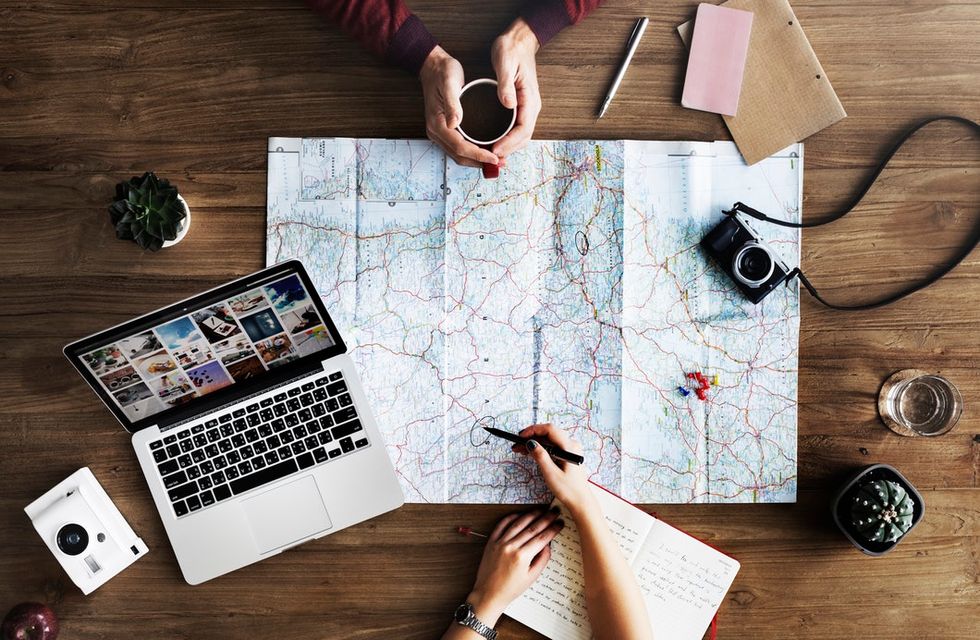When I was in middle school, my life was changed by someone's mom. She was native Korean and tried her best to communicate with and take care of me. I promised myself that I would learn about her culture and language, and one day, with a voice filled with gratitude, I would speak to her in her native language. Three years later, I have the opportunity to go to Korea, and honestly, it's proving to be a bit more expensive difficult than Kid Kaiti imagined it would be. In the spirit of camaraderie and making dreams come true, I've compiled a list of tips to help ease some of the fears and roadblocks you may experience.
1. The early bird gets the worm
While it would be nice if studying abroad was as simple as this:
It really isn't. So it is best to decide that you want to go before going to college. This allows you to begin preparing early, which could save you many headaches and coin.
2. Take initiative
As soon as you get to college, the best thing you can do is to start
Asking questions is the only way that you will figure out the answers to all of the things that will determine whether you can study abroad or not. It is best to set up a meeting with the study abroad adviser and your financial aid adviser and go from there. They are the best place to go to receive scholarship opportunity information and other nuggets that will help to make your trip possible.
3. Research, research, research
Here. I'll help you start.
Seriously. Even if you believe you know a lot of information about where you are visiting, make sure that you do enough research to at least know how to ask "Where is the bathroom?" in the country's native language. Outside of language, you should also find out exchange rates, the standard cost of living information, social and political climates, etc. especially because this information may prompt you to choose a different place.
4. Make a plan
Your trip shouldn't be all about the books. The worst thing is to be in a new country and end up like:
It is very easy to get overwhelmed with all the options you have. Make a plan of where you want to go and what you want to do, as you run the risk of going over budget if you don't have one.
5. Work out a budget
And stick to it. Nobody wants to spend their last week in a country looking like:
Money has the power to determine how much you do or don't enjoy your trip, and it is better to know your limits than to run out of money later. This is also something you can discuss with your study abroad and financial aid advisers.
6. Start saving early
Even if he looks like a praying mantis, KD is definitely on to something here.
If you have a budget, you can begin to save. This will help you to not have to worry as much about scholarships and loans, as well as give you the room to really explore. Remember to take into account exchange rates.
7. Scholarships
Everyone hoping to study abroad is like:
This can make finding scholarships really hard if you aren't in STEM, have a good GPA, aren't lower middle/lower class, aren't creative, and aren't a minority. Sometimes having a few of these traits isn't even enough. So scholarships and saving go hand in hand, as, while you can take out a loan, you don't want to, and if you've saved enough, a scholarship won't determine your ability to go.
8. Tie it into your interests
When you are in a different country, it's OK to be like
So you want to go to Spain, but you have no interest in Spanish? That''s OK. There are many interest/major specific programs that can allow you to travel without being interested in the language. Also, don't be afraid to go for something that will count for credits but not towards your major or minor.
9. Don't be afraid to ask questions
I put it a second time because it's the most important thing you can do. And I like this gif.
Seriously. Build a relationship with your advisors, program coordinators, classmates, etc. it will help make the process much more simple and enjoyable. Most of the things you will need to do, you won't know how to, and getting help will make it so much easier.
10. Stay later than the program
One of the best things about studying abroad is that you have an excuse to be somewhere else in the world for an extended period of time for (more than likely) less money than it would cost you if you wanted to go otherwise. It is always cheaper to travel through Europe or backpack through Asia when you're already in the country. Studying abroad should be the first stop on a long summer of transformative experiences.
College is about taking advantage of opportunities that you pay for are awarded. Studying abroad is perhaps one of the most gratifying, eye-opening, life-changing activities that you can partake in during your undergrad experience. Even if you have read this list and you are freaking out because you have done none of the things on it, it is okay. It can still happen, and it will still be wonderful. But do yourself a favor: pick somewhere in the world and go. You'll regret it if you don't.




















